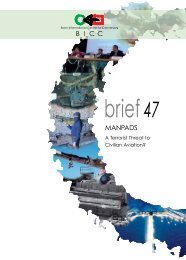egypt-final-presidential-elections-2012
egypt-final-presidential-elections-2012
egypt-final-presidential-elections-2012
You also want an ePaper? Increase the reach of your titles
YUMPU automatically turns print PDFs into web optimized ePapers that Google loves.
The Carter Center<br />
Presidential Election in Egypt<br />
12. Put in place clear provisions that allow for the<br />
impartial observation of all electoral processes<br />
and that facilitates the work of witnessing entities<br />
such as domestic and international civil<br />
society organizations.<br />
The electoral framework governing the Egyptian<br />
<strong>presidential</strong> election does not currently include<br />
any provision authorizing or guaranteeing electoral<br />
witnessing by civil society organizations or<br />
other entities, such as multilateral organizations.<br />
Impartial election witnessing by domestic and<br />
international CSOs can enhance the integrity<br />
of the election process by enabling independent<br />
analysis of the quality of the process and appropriate<br />
recommendations for improvement. It<br />
promotes public confidence, electoral participation,<br />
and can mitigate the potential for electionrelated<br />
conflict. The Carter Center strongly urges<br />
Egypt’s lawmakers to consider including provisions<br />
that provide for impartial scrutiny of the process<br />
for all future <strong>elections</strong>.<br />
In addition, in order to facilitate effective and<br />
meaningful assessments by CSOs, Egypt’s electoral<br />
authorities should (a) Establish a clear framework<br />
for witnessing organizations to follow in applying<br />
for accreditation and in operating once they have<br />
been accredited; (b) Ensure that accreditation is<br />
available prior to the start of the electoral process,<br />
which starts as early as amendments to the legal<br />
framework are discussed, and include the voter<br />
registration process and candidate nomination;<br />
(c) Provide clear channels of communication with<br />
the witnessing organizations; and most importantly,<br />
(d) Provide access to all aspects of the<br />
process for domestic and international witnesses.<br />
13. Ensure that the law safeguards the<br />
independence of civil society organizations<br />
and their work from state interference while<br />
ensuring their transparency and accountability.<br />
CSOs are important stakeholders in the election<br />
process. If allowed to operate freely, they<br />
can perform key functions that contribute to the<br />
integrity and credibility of the electoral process,<br />
such as providing voter education and acting as<br />
watchdogs of the <strong>elections</strong>. The current Egyptian<br />
legal framework governing CSOs allows for<br />
unwarranted state interference of their activities<br />
and impedes the realization of CSOs’ role as valuable<br />
independent stakeholders in the election<br />
process. To better meet its international obligations,<br />
The Carter Center urges Egypt’s future<br />
legislators to adopt new laws that guarantee the<br />
autonomy of CSOs with only minimal regulation.<br />
This will help to ensure that Egypt lives up to its<br />
obligations to ensure the right to participate in<br />
public affairs and to promote transparency.<br />
14. Ensure effective and collaborative voter education<br />
efforts by the election management body.<br />
The <strong>presidential</strong> election law gives the election<br />
management body discretionary authority to<br />
inform and educate voters about how to exercise<br />
their political rights. The EMB took some steps<br />
to educate the public, through public service<br />
announcements, instructional videos posted to<br />
official websites, and written educational material.<br />
Without the express requirement to do so,<br />
however, future EMBs might choose not to play<br />
this important role of chief educator on the<br />
electoral process. The Carter Center recommends<br />
that future EMBs should be fully obligated by the<br />
law as a nonpartisan source to inform and educate<br />
voters in line with Egypt’s commitment to take<br />
all necessary steps to ensure the realization of<br />
fundamental rights, such as the right to vote in<br />
genuine periodic <strong>elections</strong> by secret ballot and<br />
with universal suffrage.<br />
As is the case in most countries, there is<br />
more that can be done to enhance voter education<br />
further. Above all, The Carter Center<br />
urges Egypt’s future electoral authorities to take<br />
concrete steps to coordinate more closely with<br />
political parties and CSOs to maximize their voter<br />
education and information efforts.<br />
EMBs should also endeavor to expand its voter<br />
information and education campaigns to include<br />
as many forms of media as possible to provide<br />
as much coverage as possible to Egypt’s voting<br />
72



